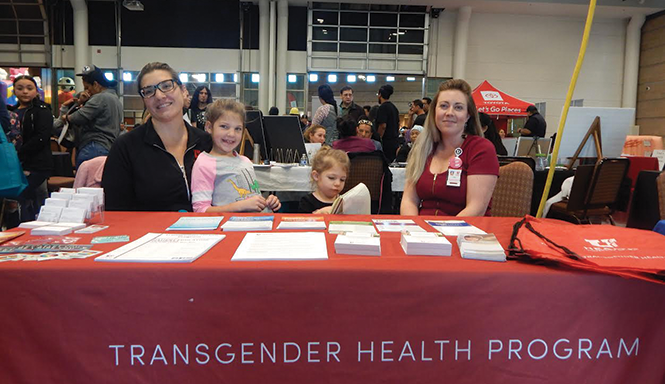Reaching Out
The U's budding Transgender Health Program expands outreach to Spanish-speaking communities.
By Peter Holslin @PeterHolslinAin't no health fair like a DJ Dirty Dave health fair.
The Salt Lake City radio DJ, co-host of the The Morning Mix at Latino 106.3 FM, kept the bass-heavy merengue, cumbia and reggaeton bumping in West Valley City as Latinx families took advantage of free clinical services and educational booths at an annual health fair organized by 106.3 FM and two other local Spanish-language radio stations last week.
In a big conference room at the Utah Cultural Celebration Center, dozens of families lined up for flu shots and cardiovascular exams. They collected vouchers for mammograms and pap smears while little kids jumped around in two bounce-y castles. At a booth run by the American Heart Association, a worker offered tips on how to perform CPR with the help of a rubber-faced mannequin.
Amid the fair festivities were Ariel Malan and Jerica Pixton, staffers at the University of Utah's Transgender Health Program—an initiative launched in 2017 that's now focusing on raising awareness about how it can help individuals in Utah going through the transitioning process.
"One of our primary goals is letting specifically the Latinx community know that the Transgender Health Program is here for them," Malan, the program coordinator, told City Weekly. "We have free interpreter services at the University of Utah for all patients and visitors, so we're definitely trying to spread the word about the services that we offer through the program for this community."
The U's Transgender Health Program consists of a team of health care providers who specialize in everything from hormone therapy to surgery to voice therapy, covering multiple aspects of a patient's journey. The process of transitioning is often complex and depends chiefly on an individual's needs and goals. To help provide a safe and gender-affirming environment, a "navigator" at the program helps patients identify what they need depending on where they are in the process—whether they're just at the beginning, or about to go into surgery, or seeking counseling and nutrition guidance.
"We serve everybody on the transgender spectrum, from non-binary, genderfluid, genderqueer—however those identities are expressed. Surgery is not for everyone. Hormone therapy is not for everyone. It's whatever that person identifies and needs," Malan noted.
Since the program's creation two years ago, the team's health care providers have worked with hundreds of patients so far; they also receive between 100 and 200 calls a month for consultations and questions about their services. Malan said the program's medical director, plastic surgeon Cori Agarwal, has spearheaded efforts and lobbied hard to bring in funding and resources to expand their reach.
This year, the program took on an administration staff, who can attend health care-related events like this one and expand other efforts related to outreach and tracking their impact.
"There's always work to be done," Pixton, who works on plastic surgery efforts in the program, said. "It's always a work in progress."
Dozens of visitors stopped by the program's booth for information at the health fair, picking up bilingual flyers offering information about the program's services and other programs they can seek out—including patient education seminars held monthly at Salt Lake's Utah Pride Center and a clinic offering gender management and support for adolescents at the Eccles Outpatient Building on The U's campus.
But as the cumbia beats thumped through the conference hall, and radio hosts got on the mic to hype up the audience and talk about the services at the fair, Malan and Pixton saw that there was more work to be done: Neither of them speak Spanish, and now they're eager to find bilingual volunteers to better bridge the language barrier as they do outreach across Salt Lake.
"We definitely understand how our patients feel when they come see us. We're in their shoes now," Pixton said.
More by Peter Holslin
-
Rebel Spirits
A Facebook group draws a bullseye on the DABC while calling for alcohol reforms.
- Dec 11, 2019
-
The Journey of Becoming You
How 'gender-affirming' philosophy and multidisciplinary care at the University of Utah's Transgender Health Program helps patients feel whole.
- Dec 4, 2019
-
Say Their Names
Transgender Day of Remembrance ceremony in the Capitol honors victims of transphobic violence.
- Nov 21, 2019
- More »
Latest in News
Readers also liked…
-
Raise a glass for E.L.T Harrison, architect of the Beerhive building on Main
Small Lake City
- Oct 11, 2023





